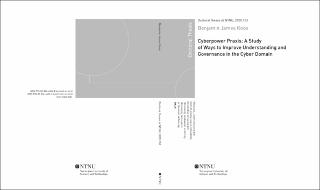Cyberpower Praxis: A Study of Ways to Improve Understanding and Governance in the Cyber Domain
Doctoral thesis
Permanent lenke
https://hdl.handle.net/11250/2653647Utgivelsesdato
2020Metadata
Vis full innførselSamlinger
Sammendrag
Powerful effects arriving through cyberspace present real-world shared problems that cannot be foreseen. This thesis acknowledges the modern-day Faustian Bargain of staying digitally dependent, staying vulnerable presented by relentless digitalisation and the internetification of our ‘Lived’ and ‘Official’ realities. This digital dependency vs. vulnerability paradox presses for approaches to education and training that develop and support the application of the theory, lessons and skills required to effectively conduct operations in cyberspace i.e. cyberpower praxis. As we experience the effects of cyberpower through rapid, and often unchecked digitalisation, we learn that human understanding and approaches to selfgovernance are lacking. This makes for an uneasy arena where complexity, contestation and emerging challenges frame the institutional landscape leading to immediate reactive practices over long-term strategies.
This thesis presents a route to better cyberpower praxis by encouraging a more open, holistic and flexible way of thinking about competence development for learners in the cyber domain. Attempting to combine capacities and skills on multiple plains via alternative forms of education can help build understanding around a common goal of harnessing or defeating cyberpower effects. As well as preparing for its emerging effects. To answer the question of identifying approaches to support performance among novice cyber operators, this research constitutes a quantitative and qualitative design with participants from across sectors as well as cadets from the Norwegian Defence Cyber Academy. The method encourages a holistic academic and applied approach to develop activities and attitudes founded upon skills such as unstructured problem solving, critical thinking, learning, reasoning and mentoring.
Dealing with the capacity cyberpower has to influence tangible and intangible assets through digital means, requires modes of human self-governance and understanding capable of mitigating maladaptive or time-dysfunctional praxis in the face of digital uncertainty. Building cognitive capacities by drawing attention to modes of education that focus on nonroutine thinking and high order cognitive skills can be judged as a step towards performance development in the cyber domain.
This evolving art requires new and experienced domain experts, leaders, operators and educators from across disciplines to combine their skills and capacities in order to remain current with evolving technologies and adversarial actions. Whilst simultaneously being able to maintain and encourage mindsets that seek to influence into the future, rather than settling for a passive reactive posture that is susceptible to rigidity.
The presented thesis aims to provide insights and knowledge to contribute to improved proficiency levels as workplace demands increase due to complex socio-technical systems. The cognitive and collaborative nature of military cyberspace operations requires high levels of knowledge, reasoning skills and critical thinking skills. This cognitive readiness needs to be anchored in adaptive, resilient and robust capabilities.
Består av
Paper 1: Knox, Benjamin James. The effect of cyberpower on institutional development in Norway. Frontiers in Psychology 2018 ;Volum 9.(MAY) s. -Paper 2: Knox, Benjamin James; Jøsok, Øyvind; Helkala, Kirsi Marjaana; Khooshabeh, Peter; Ødegaard, Terje; Lugo, Ricardo; Sütterlin, Stefan. Socio-technical communication: The Hybrid Space and the OLB-Model for science-based cyber education. Military Psychology 2018 ;Volum 30.(4) s. 350-359
Paper 3: Knox, Benjamin James; Lugo, Ricardo G.; Jøsok, Øyvind; Halkala, Kirsi; Sütterlin, Stefan. Towards a Cognitive Agility Index: The Role of Metacognition in Human Computer Interaction. HCI International 2017; 2017-07-09 - 2017-07-14. Not included due to copyright restrictions.
Paper 4: Jøsok, Øyvind; Hedberg, Mathias; Knox, Benjamin James; Helkala, Kirsi Marjaana; Sütterlin, Stefan; Lugo, Ricardo Gregorio. Development and Application of the Hybrid Space App for Measuring Cognitive Focus in Hybrid Contexts. Lecture Notes in Computer Science (LNCS) 2018 ;Volum 10915. s. 369-382. Not included due to copyright restrictions. Available at http://dx.doi.org/https://doi.org/10.1007/978-3-319-91470-1_30
Paper 5: Knox, Benjamin James; Lugo, Ricardo Gregorio; Helkala, Kirsi Marjaana; Sütterlin, Stefan. Slow Education and Cognitive Agility: Improving Military Cyber Cadet Cognitive Performance for Better Governance of Cyberpower. International Journal of Cyber Warfare and Terrorism (IJCWT) 2019 ;Volum 9.(1) s. 48-66. Not included due to copyright restrictions. Available at http://dx.doi.org/10.4018/IJCWT.2019010104
Paper 6: Lugo, Ricardo Gregorio; Firth-Clark, Andrea; Knox, Benjamin James; Jøsok, Øyvind; Helkala, Kirsi Marjaana; Sütterlin, Stefan. Cognitive Profiles and Education of Female Cyber Defence Operators. Lecture Notes in Computer Science (LNCS) 2019 ;Volum 11580 LNAI. s. 563-572. Not included due to copyright restrictions. Available at http://dx.doi.org/10.1007/978-3-030-22419-6_40
Paper 7: Knox, Benjamin James; Lugo, Ricardo Gregorio; Sütterlin, Stefan. Cognisance as a human factor in military cyber defence education. IFAC-PapersOnLine 2019 ;Volum 52.(19) s. 163-168. © 2019. This manuscript version is made available under the CC-BY-NC-ND 4.0 license http://creativecommons.org/licenses/by-nc-nd/4.0/
